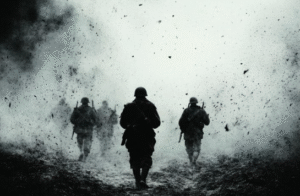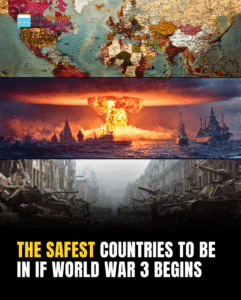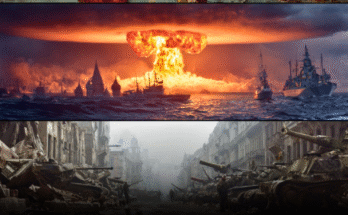
The Safest Countries To Be In If World War 3 Begins
The thought of World War III is chilling. Modern warfare, with advanced technologies and nuclear capabilities, would create devastating effects across the globe. Amid such uncertainty, people often wonder: where would you be safest if the worst happens? Geography, neutrality, political stability, food security, and distance from world powers can all determine the safest places to wait out a global conflict. Let’s explore some of the safest countries to be in if World War III begins.
1. New Zealand: Isolation and Stability
New Zealand often tops lists of safe countries due to its geographic isolation. Situated far away from most international conflicts in the South Pacific, it’s also an agricultural powerhouse. Even if global supply chains collapse, New Zealand produces enough food to support its small population. Its stable democratic government, neutrality, and peaceful society make it an ideal refuge. Plus, its mountainous terrain and sparsely populated landscape make it less strategically valuable as a military target.
2. Iceland: Remote, Peaceful, and Energy-Independent
Iceland’s North Atlantic location is so remote that it rarely plays a direct role in global conflicts. Beyond its isolation, Iceland is powered by renewable geothermal energy and supports a strong fishing industry. Even if trade routes were disrupted during a war, Iceland could continue to support itself. Its tiny, peaceful population and stable society make it unlikely to be involved in international conflicts, allowing people to live relatively untouched by outside chaos.
3. Switzerland: Famous for Its Neutrality
Switzerland’s historic neutrality is famous around the world. The small Alpine nation hasn’t taken part in any major conflicts for centuries and is committed to peace. Even its landscape provides an advantage — mountainous terrain full of natural bunkers and shelters built to house the entire population if needed. Switzerland also has strict civil defense measures and emergency food reserves that last for months. Plus, the Swiss financial system’s global ties may make aggressors think twice before targeting it.
4. Canada: Safe and Self-Sufficient
Spanning a huge landmass with a small population, Canada is an attractive safe haven. Its abundant natural resources, including freshwater, energy reserves, and agricultural produce, mean it could support itself even in isolation. Politically stable and far from most world conflicts, Canada also benefits from its defense agreements with its friendly neighbor, the United States. Even if war breaks out on a global scale, Canada’s remoteness from the most volatile parts of Europe and Asia, its climate diversity, and rich ecosystems make it a relatively safe bet.
5. Bhutan: Remote and Neutral in Asia
The tiny Himalayan kingdom of Bhutan may not come to mind at first, but its policies of neutrality and isolation make it one of the safest places to ride out a global war. Bhutan has prioritized sustainability and self-sufficiency, with its mountainous terrain and limited accessibility providing natural defenses. It also famously measures its success by Gross National Happiness instead of military power, making it less of a target. Its close proximity to India might offer some additional protection as well.
6. Chile: A Haven in the Southern Hemisphere
Chile’s geographic isolation on the far western edge of South America shields it from most conflicts. Its stable political system, strong economy, and agricultural self-reliance mean Chileans can survive without heavy reliance on imports. The Andes Mountains to the east and the Pacific Ocean to the west act as natural buffers. Historically, most world conflicts have barely touched South America, allowing countries like Chile to remain safe and secure.
7. Greenland: Sparsely Populated and Harshly Beautiful
Greenland is one of the most remote, lightly populated places on Earth. It’s a territory of Denmark and known for its extreme cold and isolation. Even if global war breaks out, Greenland’s harsh environment and lack of major military assets would discourage any interest from aggressors. While self-sufficiency might be difficult due to its climate, anyone who can plan well could find Greenland to be one of the most off-the-radar places on Earth.
8. Uruguay: Stable, Peaceful, and Prosperous
Uruguay, often overlooked on a world map, is one of South America’s most stable democracies. It enjoys a high standard of living, a strong agricultural sector, and a pacifist culture. Situated between Argentina and Brazil, it would likely stay far from any major world conflict. Its neutrality, food security, and peaceful society make it an appealing safe zone if global tensions rise.
9. Australia: Remote with Strong Resources
Although part of the Western alliance, Australia’s geographic remoteness and considerable natural resources help ensure its security. Its self-sufficient food production, stable government, and strong civil infrastructure make it capable of enduring periods of global instability. Even if some part of the world was consumed by war, Australia would have a fair chance of avoiding direct strikes.
10. Fiji: Islands Away from Conflict Zones
Finally, a more extreme example of isolation can be found in Fiji. This South Pacific archipelago is so remote that most warring powers wouldn’t even bother going near it. Its self-reliance through fishing and farming and its tropical climate would make day-to-day life sustainable during a global conflict. Plus, its small population and limited military presence mean it’s unlikely to ever become a strategic target.
Conclusion: Why Geography and Neutrality Matter
If World War III were to erupt, avoiding areas that could become military or economic targets is crucial. Countries like the United States, Russia, and China would face direct threats due to their power and influence. In contrast, geographically remote, politically neutral, and agriculturally self-sufficient nations stand a much better chance of remaining unscathed.
That’s why places like New Zealand, Iceland, and Switzerland top the list — they have historically avoided international entanglements, have stable democratic systems, and can support their populations without relying too heavily on global trade. Furthermore, countries with natural geographic defenses, like mountainous terrain or ocean isolation, offer an extra layer of safety.
When thinking about the safest countries if World War III begins, it all comes down to three main factors: distance from hotspots, political neutrality, and the ability to survive independently. While nowhere will be completely untouched if a truly global war breaks out, choosing a home in one of these countries may vastly improve your odds of staying safe.


